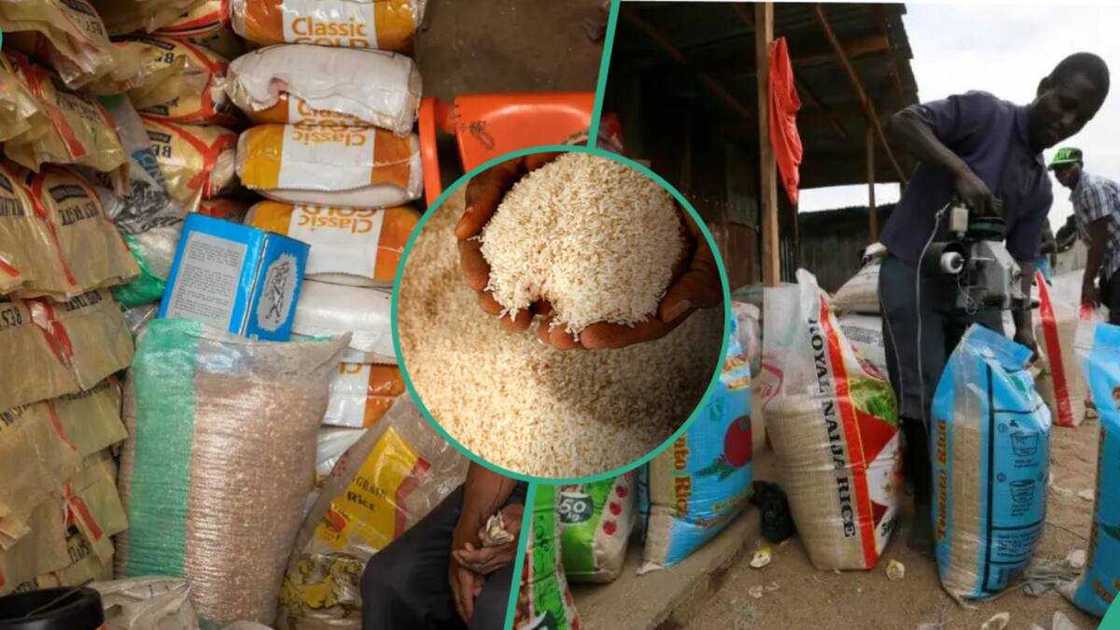Gloomy Christmas: How Price of 50kg Bag of Rice Soared From N10,000 to N100,000 in 10 Years
Legit.ng journalist Victor Enengedi has over a decade's experience covering Energy, MSMEs, Technology and the Stock Market.
CHECK OUT: Education is Your Right! Don’t Let Social Norms Hold You Back. Learn Online with LEGIT. Enroll Now!
In 2014, a 50kg bag of rice in Nigeria cost around N10,000, making it an affordable staple for most households. Fast-forward to 2024, and the price has skyrocketed to a staggering N100,000, raising concerns among consumers and traders alike.
The journey of rice prices in the past decade reveals a complex web of economic challenges, policy decisions, and global influences that have significantly impacted Nigeria’s most consumed staple.

Source: UGC
Rice: From affordable to unaffordable
The price of rice began its steep ascent in 2016 following the decision by then-President Mohammadu Buhari to ban the importation of rice through land borders.
This policy aimed to boost local production but inadvertently created a supply gap that drove prices up. By 2017, a 50kg bag of rice was selling for about N18,000 to N20,000.

Read also
“How my friend dumped his Rolls-Royces for Honda after fuel hike,” Tinubu speaks, video trends
In 2020, the COVID-19 pandemic further strained the supply chain. Restrictions on movement and border closures disrupted the importation of essential goods, including rice. By the end of that year, the price had climbed to N30,000 per bag.
The situation worsened in 2021 due to a combination of insecurity in rice-producing regions, floods, and the continued devaluation of the naira. These factors pushed the price to N50,000 by 2022.
In 2023 and 2024, inflation and rising fuel costs further compounded the problem.
The removal of fuel subsidies in 2023 caused transportation costs to soar, directly impacting food prices. The price of rice closed at N80,000 that Christmas.
By December 2024, just in time for the festive season, the price of a 50kg bag of rice reached an unprecedented N100,000.
Rice and Yuletide: A Cultural Bond
In Nigeria, rice holds a special place during the Yuletide season. It is the centrepiece of family gatherings and celebrations, often prepared as jollof rice or fried rice—dishes that symbolize joy and togetherness.
The rising cost of rice, therefore, poses not just an economic burden but also a cultural dilemma.
For many families, the ability to serve rice during Christmas and New Year’s celebrations is tied to a sense of pride and fulfilment.
Chineye Uzoka, a Lagos resident, explained to Legit.ng about the special place that rice holds in Nigerian Yuletide celebrations.
She said:
"Rice is the go-to meal for the holidays, especially Christmas day. Even if you don't have money to buy chicken, turkey or goat meat, at least rice is available for enjoyment. It's just so sad that rice is now so unaffordable that many homes will not be able to have some."
The soaring prices threaten to dampen the festive spirit, pushing some to seek alternatives like pasta, yam, or local grains such as millet and sorghum.
Traders, customers lament rice prices
Rice traders and buyers are grappling with the implications of these price hikes.
Toyin Ademoye, a trader in Lagos, lamented the challenges in the rice business. She told Legit.ng that sales have dropped drastically because the staple has become unaffordable to many Nigerians.
She said:
“The rice business as not as lucrative as it used to be. It is becoming impossible to stock enough rice. Customers now buy in smaller quantities, and sales have dropped drastically.”
Similarly, Chima Okafor, a rice trader in Lagos, said this festive period is unlike the previous in terms of patronage. He told Legit.ng that some customers are shifting to alternatives as rice has become expensive.
He said:
“We used to sell several bags daily during the festive period, but now people prefer alternatives like yam and beans.”
Consumers are equally distressed. Amaka Nwosu, a Lagos housewife, expressed her frustration at the hike in rice prices over the last few years.
She said:
"There was a time when buying rice was no big deal. It was the staple Sunday meal for most households. However, today, it’s becoming unaffordable for many Nigerians. In my family, rice is a Christmas tradition, but with these soaring prices, we may have to opt for an alternative."
Addressing the rice crisis
The journey from N10,000 to N100,000 for a bag of rice underscores the need for robust interventions in Nigeria’s agricultural sector.
Experts suggest that boosting local production through investment in mechanized farming, addressing insecurity in farming regions, and improving irrigation systems could help stabilize prices.
Additionally, reviewing trade policies to balance importation and local production may ease the pressure on consumers.
As we enter the festive season, the government must consider providing palliatives or subsidies to help mitigate the impact of rising food prices.
For now, the price of rice remains a reflection of broader economic challenges, leaving millions of Nigerians yearning for the days when a bag of rice was within reach for the average household.
Smuggled rice worsens Nigeria's Forex crisis
In related news, Legit.ng reported that the Nigerian Customs Service has warned of the consequences of smuggling prohibited items, especially rice and petrol.
The Service reiterated that the continuous smuggling of these banned goods adversely affects Nigeria's economy and creates forex woes.
Speaking to journalists, the Customs Area Controller highlighted the need to stop rice smuggling so that local rice millers can succeed.
PAY ATTENTION: Сheck out news that is picked exactly for YOU ➡️ find the “Recommended for you” block on the home page and enjoy!
Source: Legit.ng





